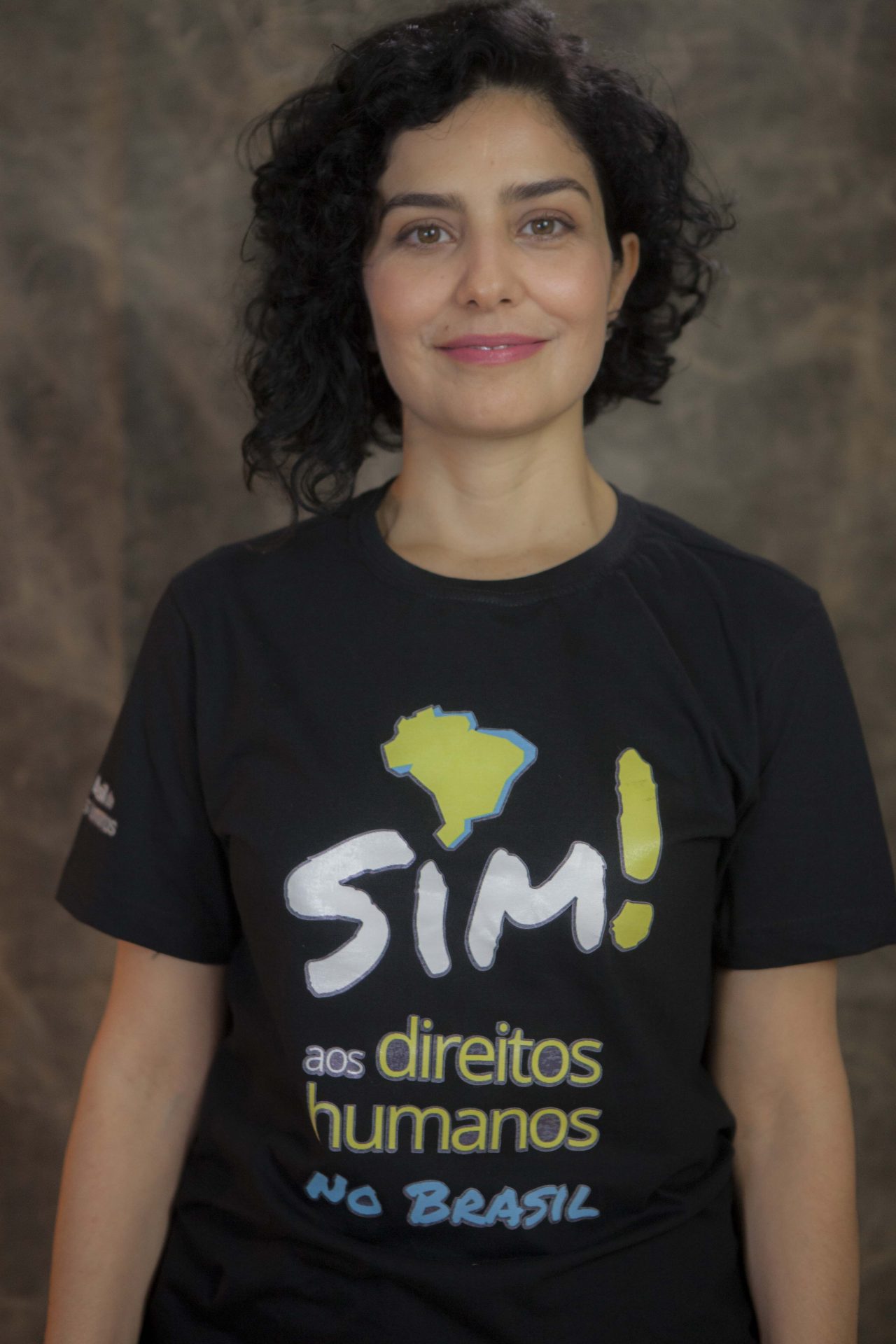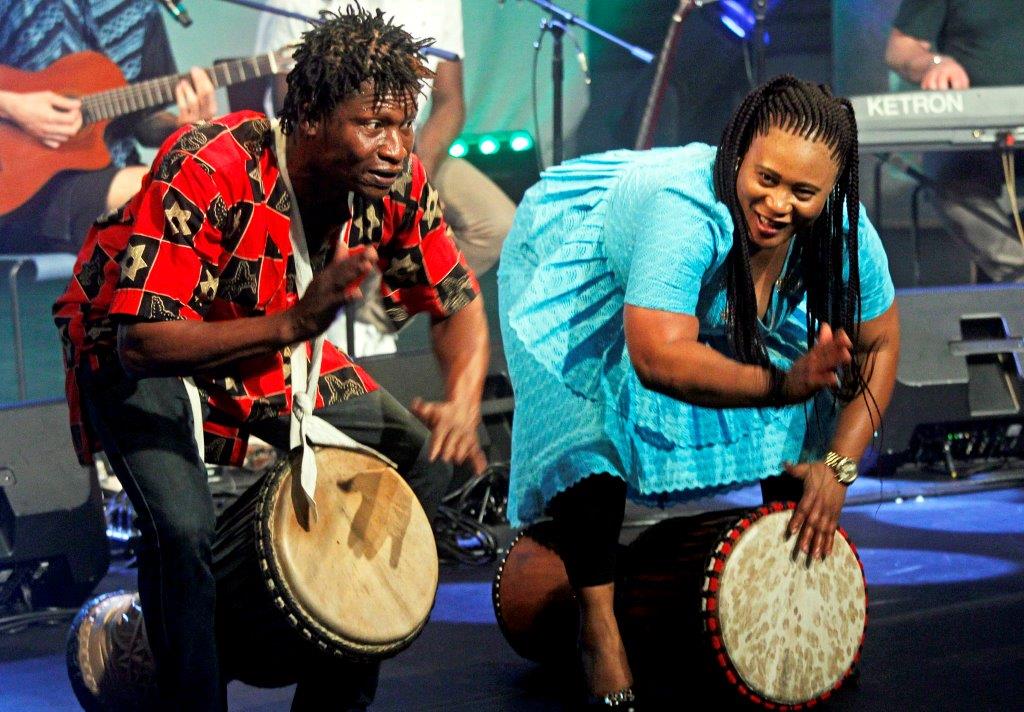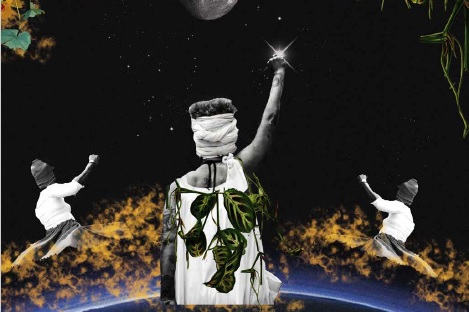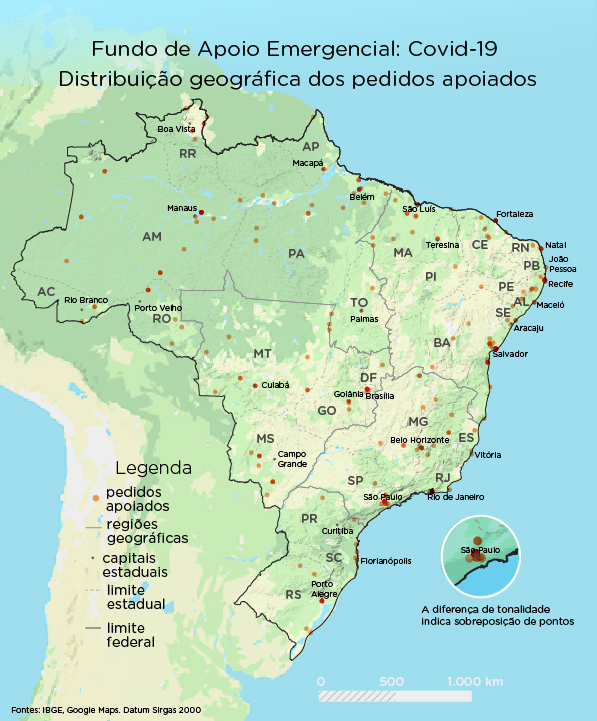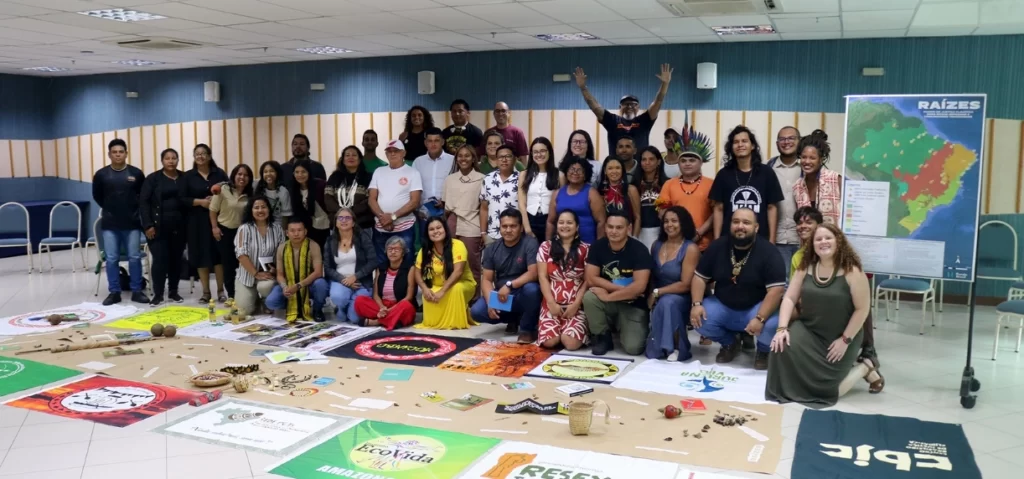
Photo: Airan Albino/Brazil Fund Collection
“520 years ago, we were here. There was no plastic, no pollution, no mining. And we survived, we are here today. So, whatever happens, we will keep living. No matter what happens, we will keep fighting and alive”, emotively expressed Genilda Maria Rodrigues, during the training for the Raízes – Indigenous Peoples and Local Communities Fund for Climate Justice.
The words by Genilda, from the Association of Women Originated from the Indigenous Lands of Apucaraninha – AMOTIA, in Paraná, echoed among the 40 representatives of Indigenous organizations and local communities gathered in São Paulo on March 19, Wednesday.
The gathering aimed to strengthen resistance networks, share stories of defense of territories, and promote the exchange of knowledge on sustainable modes of relation and preservation of nature. The climate crisis doesn’t affect everyone equally – on the contrary, it emphasizes historical inequalities and deepens processes of exclusion and injustice, mainly for Indigenous peoples and local communities. These groups, who are among the smallest contributors to abrupt climate change, are also the ones who most suffer its impacts. Their ways of life contrast directly with the unsustainable development models that intensify the problem and, at the same time, offer essential answers to the fight against it.
The training gathered groups selected through the Traditional Communities Fighting for Climate Justice and the Indigenous Peoples Fighting for Climate Justice calls for proposals, both part of the Raízes – Indigenous Peoples and Local Communities Fund for Climate Justice initiative, created by the Brazil Human Rights Fund, which acknowledges and supports those who are at the frontlines of the defense and promotion of human, socioenvironmental, and climate justice rights.
Raízes allocates resources for initiatives that protect territories, ways of life, and ancestral knowledge, promoting autonomy and sovereignty for Indigenous and local communities in the fight for their rights.
Sensorial experience and connection with the territories
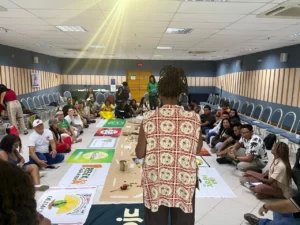
Groups, leaders and collectives participated in the dynamics during the training. Photo: Mariana Rodrigues/Brazil Fund Collection
At the head of the training activities by the Brazil Human Rights Fund, Thainá Mamede, the Fund’s projects manager and the one responsible for Raízes, and Andréia Coutinho Louback, journalist, master in Race Relations and expert in climate justice, conducted one of the most remarkable moments of the gathering. Director of the Brazilian Center for Climate Justice (CBJC), Andréia has played an essential role in the coordination of strategies and the strengthening of the debate on climate justice, with the mission to expand the public debate and influence public policies of climate justice and racial equity at different levels – local, regional or national. “The fight is for possible futures, with good living for all beings”, she highlighted.
The training for the Raízes Fund started with a deep sensorial immersion. Andréia conducted the dynamic “Voices of the River and Memories of the Land”, inviting the participants to recall affective memories of their places of origin, guided by the sounds of nature. More than a symbolic exercise, the experience reinforced the connection with the territories and brought forward reflections on the impacts of climate change and the urgency of environmental preservation, reaffirming the essential role of Indigenous peoples and local communities in the fight for climate justice.
Motivated by the atmosphere of connection and belonging that permeated the starting activities, the participants spontaneously chanted traditional prayers and songs, historically used in contexts of celebration, resistance and communal mobilization in the territories.
“I was really touched by this exercise, because we could, here in São Paulo, reconnect to our lands far away, and remember the strength that we have carried for so long in our bodies. Before any activity, we strengthen our soul and get ready for the daily struggles. Our nature, our territory, is what we have of most powerful and valuable”, said Silvana Marumbo, from the Organization of Indigenous Craftswomen – MAI, in Atalaia do Norte/AM.
The media’s gaze upon local communities
Another training activity invited those present to reflect on how the territories are portrayed by traditional media and report if their realities are being represented fairly.
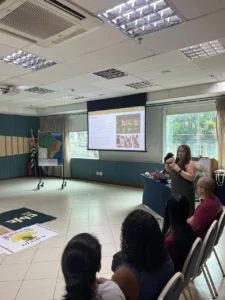
Photo: Airan Albino/Brazil Fund Collection
Within the theme “Do we feel truly represented or made invisible by the media?”, the consensus was that the way in which they are portrayed by the press distorts their struggles, creating a narrative of criminalization and invisibility. “They show the opposite of what we say. The local media says that Indigenous peoples are against development. We were never against that! The only crime I commit in my territory is to protect the forest”, says Dioclécio Mendonça, from the Mendonça Intersectoral Forum of Teachers and Leaders, in João Câmara/RN.
Klesia Lima, from the Association of Babassu Coconut Breaker Women, in inland Piauí, has also criticized the way local communities appear in the local and national news: “We want to stand for the standing forest. What they tell us is that development will come to the Indigenous communities.” She reasserted that, when local communities become news, it’s almost always to criminalize them: “they don’t acknowledge the fundamental role that we play for environmental preservation and humanity”.
To change that scenario, Karen Pataxó, from the Coordination of Indigenous Peoples and Organizations from the Northeast, Minas Gerais and Espírito Santo – Apoinme, drew attention to the need for strengthening the communication between the communities: “We need to strengthen and communicate amongst ourselves, understanding the importance of the subjects important to us”.
On the other hand, Débora Cissa, representative of the Coordination of Indigenous Organizations of the Brazilian Amazon – COIAB, from Manaus/AM, highlighted the importance of activism for effective communication: “we have to use our experience in activism to communicate.” These statements reinforce the urgency to create a more fair and authentic communication for Indigenous peoples and local communities, valuing their realities and struggles.
Climate justice in the eyes of those who defend it
In the panel “Climate Justice for Indigenous Peoples and Local Communities”, the participants reflected on the meaning of climate justice from their realities. “Our aim is to deepen the understanding of the impacts of human rights violations and environmental degradation in the rights, territories and ways of life of local communities”, explained Thainá Mamede. “Climate justice is multidimensional, encompassing the defense of territories, social justice, human and socioenvironmental rights, as well as the valuing of diverse ways of life and knowledge. More than an environmental matter, it’s also historical reparation, autonomy and guarantee of rights – without that perspective, any solution will be insufficient and excluding”.
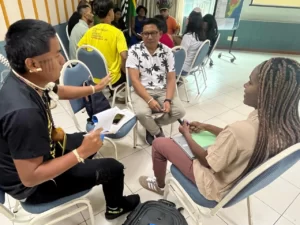
Participants debate problems and solutions for their territories. Photo: Mariana Rodrigues/Brazil Fund Collection
The organizations’ speeches reflect not only the urgency of environmental matters, but also the fight for territorial and cultural rights, and for the preservation of life in harmony with nature.
Eroka Kambeba, from OKAS, in São Paulo de Olivença/AM, hailing from a territory where environmental impacts are devastating, reasserted: “Nothing ever reaches there to us. That’s why I thank the Brazil Human Rights Fund for having reached us, where nobody ever goes to help. We are being poisoned every day. They kill us not only in combat, with bullets, but gradually, with heavy metals in the waters, air and soil”.
Ana Pataxó, of the Arewá Collective, from Santa Cruz de Cabrália/BA, highlighted that climate justice is, above all, “to ensure Indigenous peoples’ rights to preserve their territories, acknowledging the reparation and respect for the forests.”
Aldeni Nunes, of the Association of Kaxinawá Rubber Tappers, Farmers and Craftsmen from Nova Olinda, in Acre, reinforced that climate justice “gives us a right to live with dignity, with equal social rights, and brings a strengthening to our ancestral knowledge”.
For Maria Aliene, from the Association of Mangaba Collectors, in Aracaju/SE, “nature is our common good. Climate justice is hope. Climate justice is saying nature won.”
Plácido, of the Ipioca II Indigenous Association, from Feira Grande/AL, highlighted that climate justice involves a constitutional right: “It encompasses the physical and mental welfare, both of human beings as well as of the Mother Earth. We thank the Brazil Human Rights Fund for supporting us in this fight for the preservation of life”.
In Bárbara Souza’s definition, from the Urihi Yanomami Association, in Boa Vista/RR, climate justice is intimately tied to the preservation of territories and forests: “It’s the survival of a people that had all its rights denied for centuries and keeps resisting”.
For Leci Vieira, from the Committee for Indigenous Peoples and Local Communities of the Pampa, in Rio Grande do Sul, climate justice is respecting the environment, remembering that the lives of these communities are intrinsically tied to the environmental matter: “We are nature and nature is us”.
Geiza Francisca, from the Muvuca Collective, in Santarém/PA, brought forward an emotional reflection on the impact of climate change in their community: “Climate justice for us is the reparation of an inherited longing. We grew up hearing the story of a land with no evil and no curses, that was inundated by the São Francisco River barrage. Climate justice for us is reparation and bringing back our land with no evil and no curses. It is intimately tied to democracy and the right to life, considering both humans and non-humans”.
About Raízes
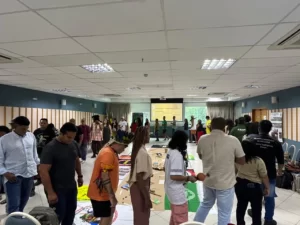
Photo: Mariana Rodrigues/Brazil Fund Collection
The Raízes – Indigenous Peoples and Local Communities Fund for Climate Justice is an initiative by the Brazil Human Rights Fund to strategically support these peoples and communities in their fights for climate and environmental justice, in the Amazon and in the other five Brazilian biomes: Cerrado, Caatinga, Atlantic Forest, Pampa and Pantanal.
Raízes has as a premise to broaden climate funding resources so they reach the spearhead, the Indigenous peoples and local communities that organize to fight for territorial and environmental rights, for human rights, and for life on the planet.
We allocate the resources in a structured manner to proposals for institutional strengthening of the organizations created and managed by these peoples and communities, and for projects of direct intervention in the territory, coming from their concrete experiences. We also act through funds to rapidly respond to emergencies such as the growing violence against activists and leaders of Indigenous peoples and local communities and the intensification of extreme climate events. Finally, we also give grants to actions of mobilization, coordination and advocacy.
Additionally, we foster in Brazilian society the debate about the role of Indigenous peoples and local communities in the mitigation of the climate crisis’ effects and about the urgency to ensure their rights.
For more information, visit the Raízes webpage.






















